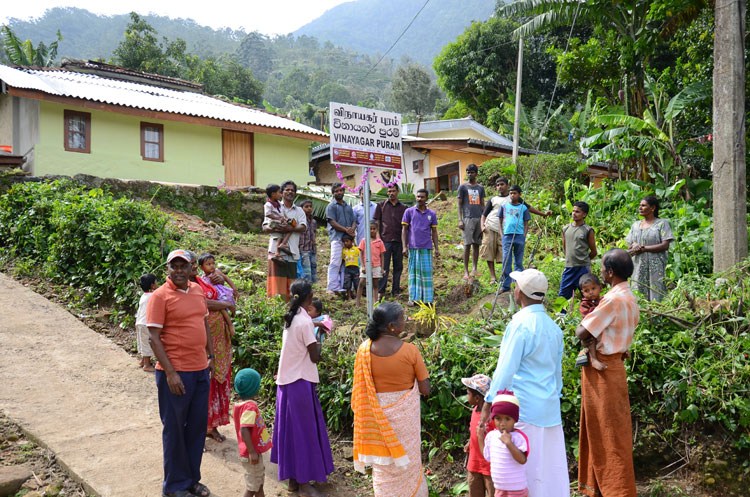By C. De Silva
A number of recent cases and complaints from many parts of Sri Lanka have resulted in court orders and directives in support of existing legal and constitutional provisions ensuring Language Equality, according to a senior researcher who manages a project promoting language rights in Sri Lanka. In a recent interview Lionel Guruge, the head of the Outreach Unit of the Centre for Policy Alternatives, which has implemented a programme in 13 districts of Sri Lanka, outlined the main legal interventions arising during the course of the programme.
During the period from 2011 to date, a number of cases relating to language were submitted before the Official Languages Commission(OLC) and the Human Rights Commission of Sri Lanka,(HRCSL) ranging from issues like the lack of Tamil language in the destination boards of private buses, language on currency notes, availability of courses in both languages in state universities, changing name boards in schools, information on government websites being made available in all languages and ensuring that hospitals have translators and bilingual documentation among others
One main case submitted was on the subject of bus destination boards and this was successful in the sense that Human Rights Commission of Sri Lanka and the Official Languages Commission both issued directives that bilingual destination boards should be in place in all public transport.
Street signs in a number of local authorities were discovered to be in one language only and therefore moves were made to regularise this matter in line with Official Language policy which makes it mandatory for all public signage to be in both the official languages. Submissions thus called on Local Authorities to ensure that all place signboards should be in both languages, to which the respondents promised to comply. Although such commitments have been obtained in writing the practicality is that in some cases action has not been carried out.
The Consumer Affairs Authority has been petitioned on the subject of many consumer items from batteries to pressure cookers, which do not contain translated information in the public interest, however there is no real way of holding them accountable so this has been futile overall.
Another case of particular relevance to daily life is the matter of the lack of translations on pharmaceuticals clarifying dosage, side effects, contraindications and other very critical information on drugs and cosmetic products. The lack of this important information in a language one can understand has the potential to be almost life threatening as can be understood in cases of medicinal drugs and even some more dangerous cosmetic items such as hair dye or harsher chemical preparations. Out of Court negotiations, backed by HRCSL directive, with the Cosmetic Devices and Drugs Authority proved nevertheless to be very protracted and difficult but a final agreement was reached that translations would gradually be made available to consumers.
Another option that was explored was that of people from language societies (local level citizen groups who activate towards language equality) making individual submissions to the office of the chief Justice of the Supreme Court, but this was found to be ineffective to date due to a lack of response to any such submissions. Letters were also sent to the Parliamentary Select Committee and replies were received but nothing beyond this. Some of the more successful complaints were those brought before the HRC SL which has the authority to summon the respondent and complainant together, which helps in reaching a quicker settlement. The OLC on the other hand only advises the respondent.
Perhaps one of the most important cases supported by the CPA was to request that the National Identity Card be issued bilingually, and this was filed by a youth from Ananda College, Colombo who petitioned that identity cards issued only in Sinhala cause problems when one is employed in the North or East and citing arbitrary treatment and a denial of freedom of movement. The petitioner asked that the Department of Registration of Persons be ordered to issue the Identity cards in Sinhala and Tamil.
This case was successful and on 21st October 2013, the Supreme Court issued an order to the Department of Registration of Persons to issue all National Identity Cards in both languages, from the 1st of January 2014.
It has to be mentioned that within the justice system itself language rights are often overlooked and signboards and documentation in Police Stations and the Supreme Court itself are only in Sinhala and English or English alone.
Working to complement the recently set up complaints hotline of the Ministry of National languages and Social Integration, the CPA project also installed more than 45 billboards giving publicity to the 1956 hotline, and is due to launch a Trilingual Common Signage CD which will have more than a 1000 words in all three languages in printable formats, for use in all manner of private and public sector offices and commercial outlets.
The project is also set to launch the findings of its recent mini-audit of the State of Bilingual availability of Bus Signage and Railway announcements, at a public discussion on the 10th December at the O.P.A, Colombo 07. For more information:http://outreachlk.wordpress.com/ or enquire from vibhasha@cpalanka.org





